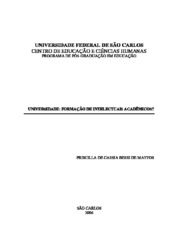| dc.contributor.author | Mattos, Priscilla de Cassia Bessi de | |
| dc.date.accessioned | 2016-06-02T19:38:46Z | |
| dc.date.available | 2007-08-31 | |
| dc.date.available | 2016-06-02T19:38:46Z | |
| dc.date.issued | 2006-08-30 | |
| dc.identifier.citation | MATTOS, Priscilla de Cassia Bessi de. Universidade: formação de intelectuais acadêmicos?. 2006. 185 f. Dissertação (Mestrado em Ciências Humanas) - Universidade Federal de São Carlos, São Carlos, 2006. | por |
| dc.identifier.uri | https://repositorio.ufscar.br/handle/ufscar/2403 | |
| dc.description.abstract | This work has as general objective to analyze the profile assumed for university professors
from the areas of social science belonging to the São Paulo State Universities (USP,
UNICAMP and UNESP), as well their opinions and reactions a respect of the fast socialeconomic,
politic and cultural transformations occurred in the country in the last decades,
whose influences reflect incisively on the university institutions and on the positioning of
themselves with relation to their proper intellectual condition. In a more specific way we
searched during this research to answer the following question: "How the university
professors conceive their functions and what type of intellectuals our public universities are
forming?" It is a qualitative inquiry based in structuralized open interviews by the way of a
script previously elaborated using the research problem. Besides the development of the
interviews has became necessary a bibliographical study about intellectuals, culture,
university, university professors and society, having as theoretical referential the classic
treatment on the elected subjects above, in special, the analysis about the scientific field
developed by French sociologist Pierre Bourdieu. The collected data could evidenced that the
university professors see themselves as responsible for the critical and for the possible
intervention in the society, the academic intellectuals are pointed as those that possess the
function to commit themselves to certain practices and try to realize specific changes in the
environment in which they are inserted, their work is to be intent to their proper position and
how this affects their studies. When describing their functions and reflecting on the university
objective in the contemporary society, these protagonists point with respect to the inefficiency
of this new model of university, implanted after the University Reformation in 1968, which
gives privileges to the scientific and technological development, in order to stimulate the
economic growth of the country, for the formation of new generations of intellectuals that,
impressionable with the reduction of the time of the intellectual work and the intense
production of bureaucratic reports demanded by the State and by the agencies of research
promotion, specializes each time more early, disabling a intellectual work, in the sense of
critic, reflexive and politician. | eng |
| dc.format | application/pdf | por |
| dc.language | por | por |
| dc.publisher | Universidade Federal de São Carlos | por |
| dc.rights | Acesso Aberto | por |
| dc.subject | Ensino superior | por |
| dc.subject | Professores - formação | por |
| dc.subject | Intelectuais | por |
| dc.title | Universidade: formação de intelectuais acadêmicos? | por |
| dc.type | Dissertação | por |
| dc.contributor.advisor1 | Buffa, Ester | |
| dc.contributor.advisor1Lattes | http://genos.cnpq.br:12010/dwlattes/owa/prc_imp_cv_int?f_cod=K4788831T4 | por |
| dc.description.resumo | Este trabalho tem como objetivo geral analisar o perfil assumido por professores
universitários das áreas de ciências humanas pertencentes às Universidades Estaduais
Paulistas (USP, UNICAMP e UNESP), bem como suas opiniões e reações frente às
aceleradas transformações sócio-econômicas, políticas e culturais ocorridas no país nas
últimas décadas, cujas influências refletem incisivamente sobre as instituições universitárias e
sobre o posicionamento destes com relação à sua própria condição de intelectual. De forma
mais específica buscamos ao longo desta pesquisa responder a seguinte questão: como os
professores universitários concebem as suas funções e que tipo de intelectuais nossas
universidades públicas estão formando? É uma investigação de natureza qualitativa pautada
em entrevistas abertas estruturadas por meio de um roteiro previamente elaborado a partir do
problema de pesquisa. Além do desenvolvimento de entrevistas tornou-se necessário um
estudo bibliográfico sobre intelectuais, cultura, universidade, professores universitários e
sociedade, tendo como referencial teórico as abordagens clássicas sobre os temas elencados
acima, em especial, a análise sobre o campo científico desenvolvida pelo sociólogo francês
Pierre Bourdieu. A partir dos dados coletados pôde-se constatar que os professores
universitários se vêem como responsáveis pela crítica e pela possível intervenção na
sociedade, os intelectuais acadêmicos são apontados como aqueles que possuem a função de
comprometer-se com certas práticas e tentar realizar mudanças específicas no ambiente no
qual estão inseridos, seu trabalho é estar atento à sua própria posição e como isso afeta seus
estudos. Ao descreverem suas funções e refletirem sobre o papel da universidade na sociedade
contemporânea, estes protagonistas apontam para a ineficiência deste novo modelo de
universidade, implantado após a Reforma Universitária de 1968, que privilegia o
desenvolvimento científico e tecnológico, a fim de impulsionar o crescimento econômico do
país, para a formação das novas gerações de intelectuais que, assoberbadas com a diminuição
do tempo do trabalho intelectual e a intensa produção relatórios burocráticos exigidos pelo
Estado e pelas agências de fomento à pesquisa, especializam-se cada vez mais cedo,
impossibilitando um trabalho intelectual, no sentido de crítico, reflexivo e político. | por |
| dc.publisher.country | BR | por |
| dc.publisher.initials | UFSCar | por |
| dc.publisher.program | Programa de Pós-Graduação em Educação - PPGE | por |
| dc.subject.cnpq | CIENCIAS HUMANAS::EDUCACAO | por |
